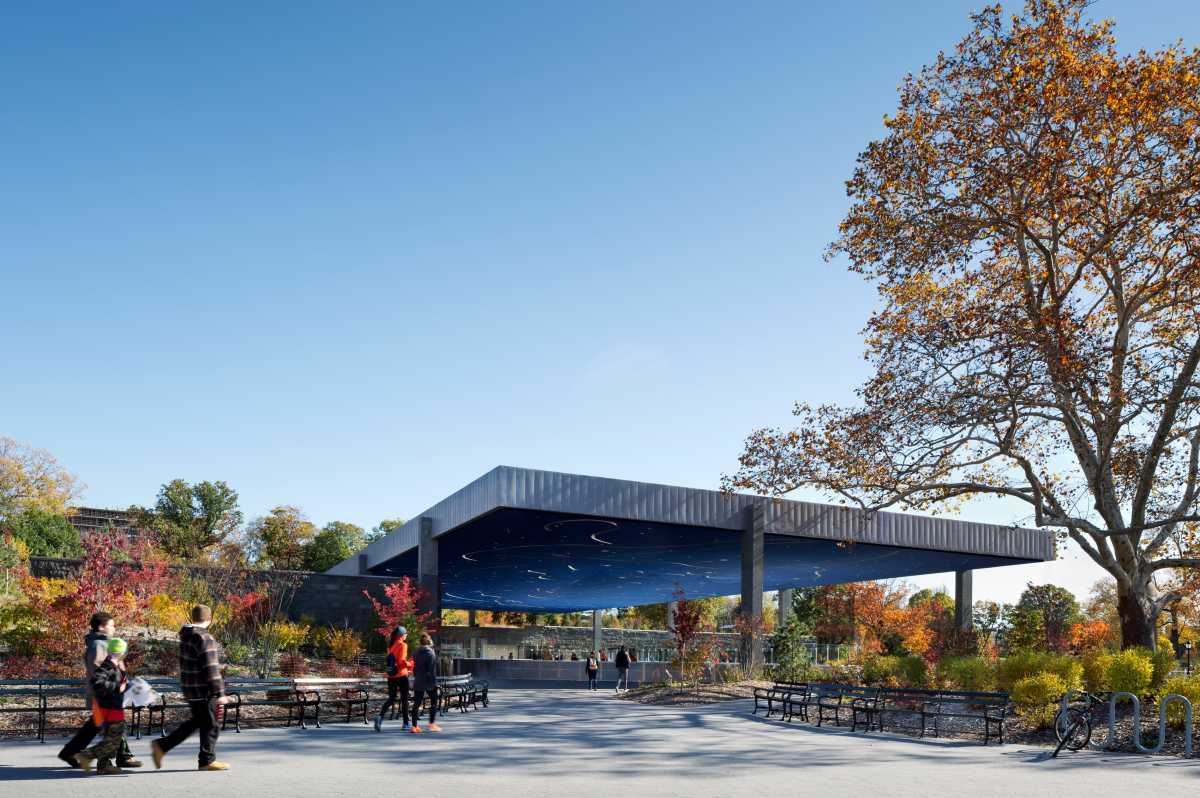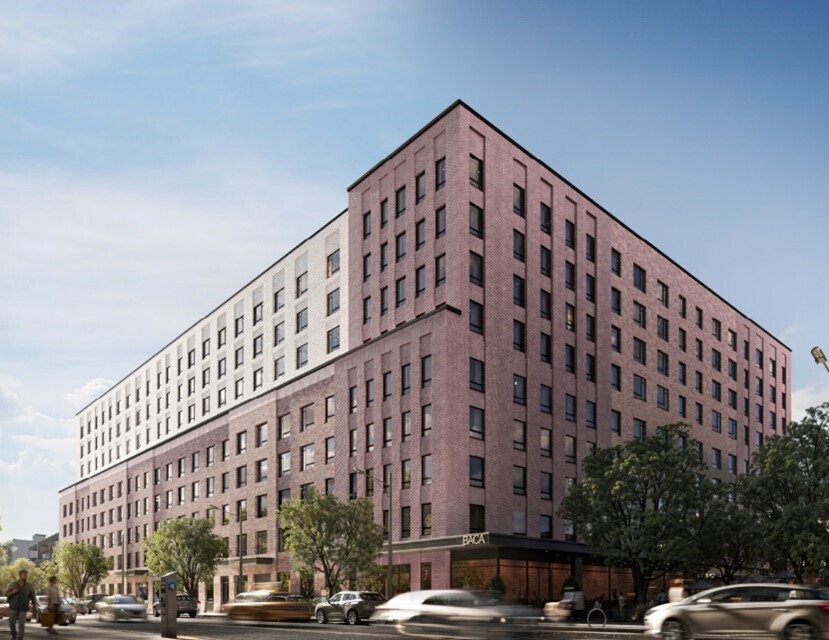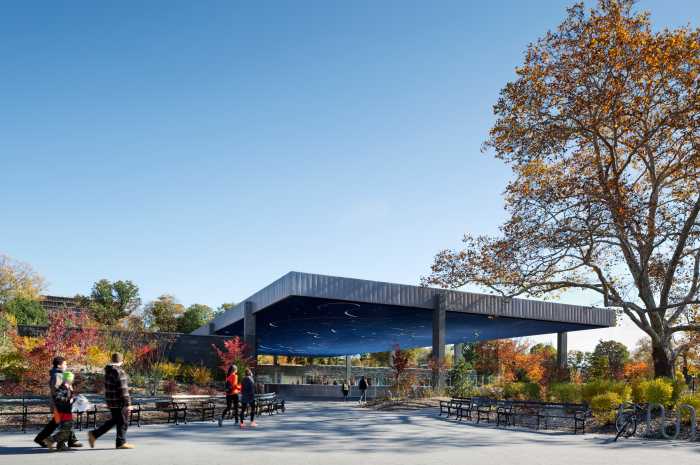By Julie Shapiro
An unusually festive mood pervaded the Battery Park City Authority’s monthly board meeting Tuesday morning when the board approved a deal to extend rent protections at Gateway Plaza.
Several dozen of Gateway’s 3,500 tenants turned out to the meeting, cheering as tenant leader Linda Belfer spoke in favor of the deal, first announced last month, which would allow all current tenants to stay in their homes for the next 11 years.
“This is the first time I’ve heard whistling at one of these meetings,” B.P.C.A. chairperson James Gill said when Belfer finished. “And that’s a good thing.”
The board then spent the next hour discussing and ultimately approving the deal, which Assembly Speaker Sheldon Silver brokered with The LeFrak Organization, Gateway Plaza’s owner.
The complex’s 1,705 protected units were slated to go to market rate at the end of next month, but Silver’s deal will give all current tenants the right of renewal at stabilized rates for the next 11 years. The deal does not apply to new tenants, who will come in at market rate and will have no guarantee of renewal leases.
“I am ecstatic,” Belfer said after the authority approved the deal. “We’re all very, very happy.”
The vote put the final stamp of approval on the “handshake” agreement Silver announced last month. The authority’s board meeting was the first time the specifics of that deal were made public.
The leverage Silver and the authority used to make the deal was that LeFrak’s ground lease, or the amount of money LeFrak has to pay the authority each year, is slated to go up dramatically in 2023. LeFrak now pays a little more than $300,000 a year in ground rent, but in 2023 the rent would increase to 8 percent of the fair market value of the property, which authority consultants estimated would cost LeFrak $30 million a year. That estimate is very conservative, based on the prediction that land values will take more than a decade to rebound from the current downturn.
LeFrak came to the bargaining table hoping to lock in a lower ground rent figure, said Robert Serpico, the authority’s chief financial officer. Serpico said LeFrak wanted certainty about the future so they could get financing for capital improvements at the building now.
“It’s hard to get loans if you have a big question mark out there,” Serpico said.
Under the deal, rather than the ground rent increasing to 8 percent of fair market value, it will increase to 8.125 percent of collected rents. That percentage will remain in place until Gateway’s next ground rent reset in 2040. Over the 17 years between 2023 and 2040, LeFrak will pay an average of $12 million a year in ground rent, the authority’s consultants projected. That is far less than the estimated $30 million they would have had to pay without this deal. Some B.P.C. condos are also subject to sharp ground rent increases and the authority has reached deals with two buildings whose rents were going to jump in the next few years.
The average $18 million a year that LeFrak will save is not merely a gift from the authority — it is a reimbursement to LeFrak for the cost of keeping the complex affordable. The stabilization extension will cost about $80 million over the next 11 years, all of which the authority will reimburse to LeFrak starting in 2023.
To determine the $80 million estimate, the authority’s consultants at real estate firm Holliday Fenoglio Fowler calculated the difference between market rate and what the tenants are currently paying, then extended those projections 11 years into the future. Gateway tenants now pay $36 per square foot on average, while market rate is $46 per square foot, said Joe Morningstar, senior managing director with H.F.F.
The actual difference between market rate and the tenants’ rents could be significantly more or less than $80 million, depending on the market and how many tenants stay in their apartments for the next 11 years.
Morningstar thinks that by 2020, when the 11-year agreement expires, less than 40 percent of the current tenants will still be living in the building, meaning that over 60 percent will be paying market rates. Maintaining rent-stabilization will cost LeFrak $13 million the first year and the annual cost will decrease after that, Morningstar said.
Morningstar has been working with Silver, LeFrak and the authority on the terms of the deal for more than a year.
“There was a lot of pushing,” Morningstar said at the authority board meeting Tuesday. “There was a lot of horse-trading back and forth…. There was a lot of screaming and yelling.”
This is the third time Silver has procured a rent-stabilization extension for Gateway, a concept LeFrak vehemently resisted.
“They’re a fair group but they’re a tough group,” Serpico said of LeFrak.
LeFrak did not respond to a request for comment and has not commented on the deal since it was announced in April. In an interview with Downtown Express prior to the ’05 agreement, Richard LeFrak, chairperson and C.E.O. of the firm, said he had no intention of continuing the restrictions and looked forward to the day when the free market would determine the rents.
During Tuesday’s discussion of the deal, several authority board members raised concerns about the financial and policy details. But they all ultimately voted in favor of it, except for chairperson Gill, who recused himself because his son lives in Gateway.
Charles Urstadt, vice chairperson of the board, criticized the authority staff for not keeping the board better informed about the terms of the negotiations.
“All we have is a one-page summary,” Urstadt said. “It’s unfair to the members to be asked to pass on something as vital as this…. We should know what the financial impact on this board is, on this authority.”
Urstadt also questioned whether the authority staff had sufficiently informed the city about the deal with LeFrak.
Every year, the authority turns its surplus over to the city, and the money has historically gone to both the general fund and to subsidize affordable housing. Since the Gateway deal gives LeFrak a break on ground rent starting in 2023, the deal will decrease the amount of money that would have gone to the city. So, Urstadt reasoned, the city should also be aware of the deal and approve it.
Jim Cavanaugh, president of the authority, replied that the city is aware of the deal and its terms, but the city chose not to participate in the discussions.
“We can’t compel them to weigh in,” Cavanaugh said.
Urstadt replied, “I’m not satisfied with that answer.”
Urstadt requested copies of the correspondence between the authority and the city. Robert Mueller, a board member, said documentation could become important in case a future city administration criticized the deal down the road.
The mayor’s press office did comment.
David Cornstein, another board member, questioned some of the financials behind the deal. But, nodding to the overflow crowd of Gateway tenants, mainly seniors, he said, “There’s an urgency to get something done with this.”
The number Cornstein questioned was the projected property value of Gateway in 2023. The current value is between $145 and $175 per square foot, and Morningstar, the consultant, estimated that the value would only rise to $195 per square foot by 2023.
“I think it’s a very conservative estimate of the value of the land,” Cornstein said.
Morningstar said land values have fallen sharply over the past two years, and that at the height of the bubble Gateway could have been worth about $350 per square foot. But he doesn’t expect the market to rebound quickly, and even when it does, the only residential buildings that will return to such high prices will be condos, he said.
Morningstar also gave figures for the rents current tenants are paying, which were higher than some board members expected. One-bedrooms rent for $2,300 on average, while two-bedrooms go for about $3,100, he said. The reason the averages are so high is that new tenants have always come into the building at market rate, balancing out the longtime tenants who locked in lower rates decades ago and pay only stabilized increases.
The just-approved deal with LeFrak also includes LeFrak’s promise to renovate the lobbies, do landscaping and improve the S. End Ave. plaza entrance. Under the deal, the authority also promises to include Gateway Plaza in any program to sell fee interests in Battery Park City, though no such program exists yet.
As the crowd of tenants waited to hear the authority’s verdict, Cavanaugh praised them, and particularly tenant leader Belfer, for balancing patience with aggressiveness.
“I don’t know what I’m going to do without [the] frequent phone calls from Linda Belfer,” Cavanaugh said.
Belfer told him not to worry.
“I’ll call you anyway, Jim,” she said.
Julie@DowntownExpress.com


































